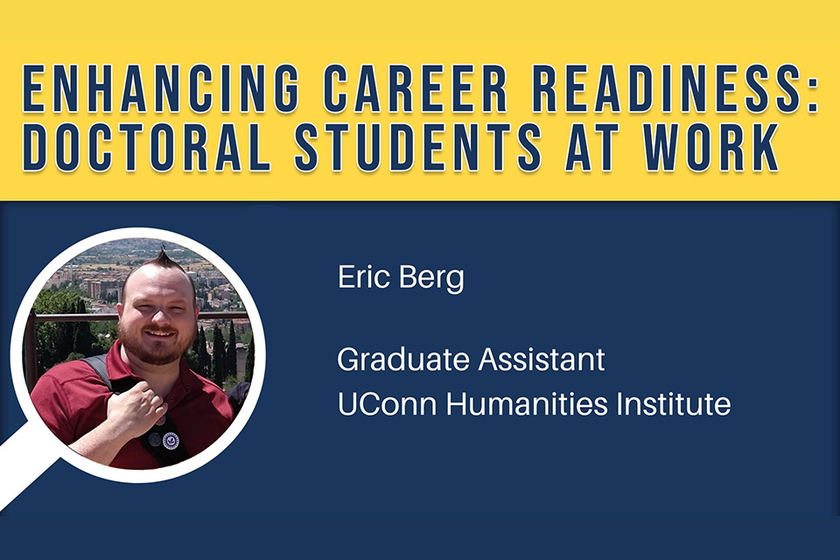
“Being a graduate student doesn’t mean that you have to stop learning while starting teaching. You’ll probably be a better teacher when you are learning at the same time,” Eric Berg said.
Eric is a PhD candidate in the Philosophy Department. It is his second year working at UConn Humanities Institute as a Graduate Assistant.
Day-to-day life at the Humanities Institute
Eric’s roles comprise three parts: general office work, event planning and support, and research-related work. Managing the logistics of events is the major component of his work. By now, he has assisted with 100+ conferences and events. “I need to know all the conferencing technologies and logistics. I learned how to set up the conference rooms with microphones and cameras,” said Eric.
He also helps to identify and connect with event speakers, arrange catering and hotels, take notes, and manage promotions. “It’s a great opportunity to see what is behind the scenes to put together different academic events,” Eric added.
Integration of work experience, academic, and personal interests into work
Eric’s work experience beyond academia includes the restaurant industry and after-school childcare programs, which helps with event logistics and time management in his current role. His research focuses on the language and techniques used by online propaganda for radicalization and extremism. In addition to that, he also has a broad interest in different fields like sociology, anthropology, psychology, history studies, and Jewish studies, among others. Eric sees his academic interests naturally fit into his role at the Humanities Institute where event management is a primary responsibility. Being philosophical and journalistic is a part of his personality, as Eric put it, he finds that integrating nicely with what he does in his role. From identifying potential speakers to involving himself in different talks and events, what he is doing in his job broadens his knowledge and aligns with his interest in learning.

Career gains and growth
In terms of career competencies, his current role at the Humanities Institute has helped strengthen several types of skills. Verbal and written communication skills are two of them. “I need to communicate what needs to be done through emails and in-person conversations,” said Eric, “I got to know how to interact with guest speakers in a professional way – not too pushy nor invading.”
Some of the other skills enhanced through his work include leadership skills and teamwork. “There are usually lots of projects going on at the same time and they need to be done effectively and require operational management and division of labor,” Eric reflects.
Advice for graduate students
Time management is an important piece of advice he would like to share with other graduate students. In addition to his GA role, he is also a Graduate Employee Union steward for his district. Navigating different commitments among work, academic life, community, and family, he finds it helpful to have a centralized calendar at hand to keep track of events and schedules. For him, what also helps is to divide his day into focused segments instead of bouncing between responsibilities or only focusing on one goal.
Eric strongly recommends considering a GA-ship beyond one’s academic department. “You can stay more connected with the University, get to know what other departments are like, and connect with other people,” he said.
